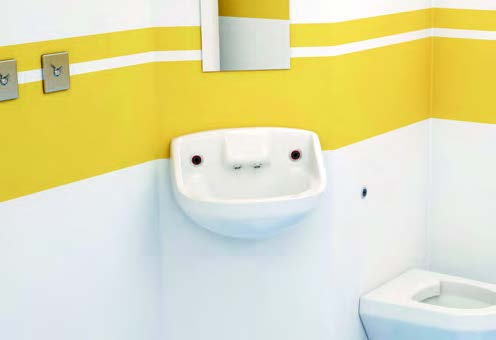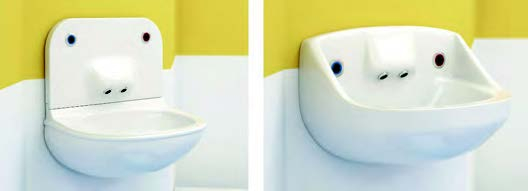
Exploring how anti-ligature considerations are driving the design of new mental health washroom products.
The safety of patients, staff and visitors is a key consideration when designing mental health facilities.
The National Confidential Inquiry identified approaches which can contribute to a reduction in suicide rates, including the assessment of ward areas to identify ligatures and ligature points. These are further highlighted in the Preventing Suicide in England - a cross-government outcomes strategy.
Hanging has been identified as still the most-frequent method of suicide in inpatient areas. The most-common ligature points are doors and windows, and this is where R&D is focused.
A plethora of products have been designed to both prevent a ligature from being attached, and manufactured to fail if a certain weight is placed on them.
And the risk that even the smallest fixtures and fittings can carry is also being addressed by forward-thinking manufacturers.


Mitigating risks in bathrooms
One of the areas currently under the spotlight is the bathroom. Health Building Note 03-01: Adult acute mental health units states: “Spaces where service users may not be continually supervised by staff, for example in bedrooms and toilets, should be designed, constructed and furnished to make self-harm or ligature as difficult as possible. All sanitary facilities and fittings should be of robust construction, ligature-free and constituted of materials that will withstand sustained attack.”
The high ligature risk in unobserved en-suite or bathroom areas was singled out as a primary concern in many of the CQC’s recent mental health inspections.
Companies at the forefront of washroom product design
Wallgate
Over 25 years, Wallgate have developed an extensive range of sanitaryware and water management systems. They now work with over 85% of the mental health trusts and private care providers in the UK and export product solutions worldwide.
A Wallgate spokesman said, “Mental health environments are first and foremost hospitals and although they’re designed to keep a patient safe, we’re also looking to help aid recovery".
“Based on the industry feedback, the HBN/HTM standards, and our years of industry experience from a variety of secure sectors; we have tried to design sanitaryware that is safe AND normalises the products to provide a comfortable environment for patients".
Ensuring new products meet these two seemingly-conflicting drivers is key to design. The spokesman explains, “We are constantly developing new products to meet customer requirements, both in the design of the physical sanitaryware and the functionality of the associated electronic water management systems.”
Products
- anti-ligature toilets with fixed seats. These look like a traditional seat, but without the associated risks. There are many colour options to match any interior design approach, and have been developed via a seamless manufacturing method to ease cleaning.
- showers and baths with anti-ligature buttons or infrared sensors and integral water outlets. The shower units themselves are available as wall or ceiling-mounted systems which are fully anti-ligature.
- vanity tops designed from high-grade solid surface materials finished as a single seamless piece with a range of anti-ligature bowls and taps available.
Wallgate case studies
Wallgate products have been fitted in:
Titan Security
Aimed at high-risk environments, Titan Security's anti-ligature bathroom range is again designed to combine aesthetics and safety.
As well as being anti ligature, they are also vandalproof with a virtually-unbreakable design to prevent abuse, assault or self harm.
Products
As well as sinks and toilets, the company also has a range of hooks, grabrails and handles, soap dispensers, shelves, mirrors, curtain tracks, and sensors and controls – all helping to create a more-homelike environment within mental health units.
Advice to specifiers
The Wallgate spokesman said: “Anti-ligature product development, across all industries, is moving very quickly as customer and patient needs develop.
“We would recommend that customers work with their suppliers to develop solutions for the type and level of care being provided, to increase the longevity of the environment and to ultimately minimise costs in the long term.”
The company is planning to launch a number of new anti-ligature sanitaryware products in the next few months.